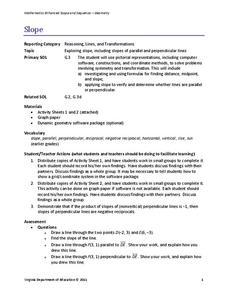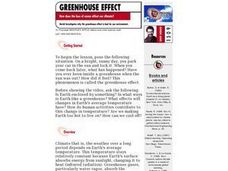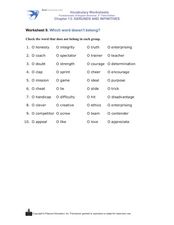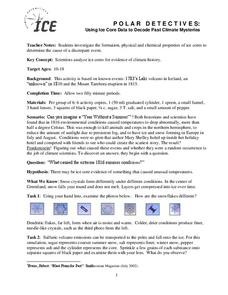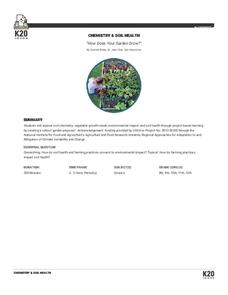02 x 02 Worksheets
Slope
What does slope have to do with lines? Pupils work with lines and determine the slope of the lines informally and with the slope formula. Groups use their knowledge to calculate the slopes of parallel and perpendicular lines. They also...
PBS
The Lowdown — Poverty Trends: What Does It Mean to Be Poor in America?
Here's a resource that's rich with learning opportunities. Future mathematicians investigate the poverty rate in America over time. They use an interactive to compare the poverty rate during the Great Recession of 2008 to other years,...
Curated OER
Do We Control Nature, or Does Nature Control Us?
Student examine the theme of man versus nature in art. In this man versus nature instructional activity, students examine various pieces of art and discuss the theme as it is depicted. They discuss whether the themes shown in the artwork...
Curated OER
Does Your Chewing Gum Lose Its Flavor?
Students determine the amount of sugar in various types of gum. They chew a piece of gum until it loses its flavor and leave it to dry in order to weigh it and determine the amount of mass lost, and describe an experiment to determine...
Curated OER
How Many Penguins Does It Take? Studying Carrying Capacity and Limiting Factors
How does a population's habitat determine the size of that population? Teach learners about carrying capacity and limiting factors with an engaging roleplay activity. Class members pose as a colony of penguins who must gather food amidst...
Curated OER
How Many Rocks Does it Take to Make a Light Bulb?
A really good worksheet on the periodic table of the elements is here for you. Learners must color in the elements listed in the worksheet that are needed to make a light bulb. They then answer questions about each of the elements.
American Chemical Society
Why Does Water Dissolve Sugar?
Did you know that if you wait long enough, the M on the outside of an M and M will float to the surface when submerged in water? Learners observe the sugar coating of an M and M while it is dissolving in water. They explain how this...
Constitutional Rights Foundation
Plyler v. Doe: Can States Deny Public Benefits to Illegal Immigrants?
Illegal immigration is an ever-changing source of consistent controversy. A reading passage about the rights of undocumented workers and illegal immigrants—and the lack thereof—guides high schoolers into a mock trial activity. Three...
PBS
Journalism in War Time: What Does the Public Need to Know?
A viewing of the documentary War Feels Like War, launches an exploration of the importance of accurate and comprehensive war reporting. Groups investigate various news agencies and assess the factors that influence their stories. A...
Federal Reserve Bank
GDP: Does It Measure Up?
Here is resource that offers a very clear explanation for how economists measure economic growth by comparing real GDP over time. There is also an additional worksheet that details the expenditure method and four components for...
American Chemical Society
Why Does Water Dissolve Salt?
Individuals explore solubility by modeling how water dissolves salts. They then view a video and compare how well water and alcohol dissolve salts, relating their comparisons to the structure of each molecule.
Curated OER
How Does the Loss of Ozone Affect Our Climate
Students explore the greenhouse effect and what it does to the environment. They discuss if and how human behavior contributes to global warming and test natural materials for carbon content.
Curated OER
How Does Your Insect Move?: Graph
In this insect behavior bar graph worksheet, students will ask their classmates how their insect moves: does it walk, swim, fly or jump? Then students will record the responses to complete the graph.
Curated OER
Which Word Does Not Belong?
In this identifying antonyms worksheet, students read three words, match the antonyms, and write the word that does not belong. Students write twelve answers.
University of Texas
Observing the Moon
Why does it look like there is a man on the moon? Why does the moon look different every night? These are the focus questions of a lesson that prompts class members to observe and record the nightly changes of Earth's natural...
K5 Learning
A Cold Bear
Who is the main character and how does this character prepare for winter? As learners read a short passage, they think about how the bear is preparing for hibernation and respond to five questions about what they read.
Polar Trec
Polar Detectives: Using Ice Core Data to Decode Past Climate Mysteries
How does examining an ice core tell us about weather? Learners set up and explore fake ice cores made of sugar, salt, and ash to represent historical snowfall and volcanic eruptions. From their setups, scholars determine what caused the...
Baylor College
It Begins with the Heart
Aspiring anatomists label a photograph of a human heart by comparing it to a colored diagram on the same page. The video that is mentioned in the procedure does not seem to be available, but the overview provides plentiful background...
West Contra Costa Unified School District
Interest and the Number e
Mary, Mary, quite continuously, how does your money grow? Uses examples to examine the difference between simple interest and compound interest, and to take a look at different rates of compounding. Learners explore what would...
PBS
Amid Rising Economic Inequality, Does America Need a Third Reconstruction?
Young political scientists investigate the Poor People's Campaign protest held in Washington, D.C., on June 18, 2022. They research how the event was reported in various news outlets and consider their stance on whether...
Anti-Defamation League
Intent vs. Impact: Why Does it Matter?
Contrary to the popular saying, words can hurt. Words matter! Tweens and teens can reflect on how words impact others even if the intent wasn't how the words were perceived. After examining an Instagram post where Lizzo apologized for...
Curated OER
How Does Your Garden Grow?
Young gardners read and listen to books about seeds, plants, and the growing process. They plant seeds in plastic cups to observe the process of root-growing and plant formation. The whole class walks through a field to collect seeds...
Curated OER
Where Does It Come From?
Do you or your learners know where apples or potato chips come from? If not, you will after this lesson. To explore careers in agriculture, learners first examine the importance of agriculture to our nation. They view several movies...
K20 LEARN
How Does Your Garden Grow?
Seventy thousand different types of soil exist in the United States alone. Young scientists learn about the importance of soil to the food supply. They test soil for a variety of factors and determine the best place to set up a community...
Other popular searches
- Picture Does Not Belong
- Life Doesn't Frighten Me
- Al Capone Does My Shirts
- Do and Does
- Sentence Doesn't Belong
- Which Word Does Not Belong
- Beatrice Doesn't Want To
- Does Not Belong
- How Does Light Travel
- Sentence Does Not Belong
- Which Does Not Belong
- Anansi Does the Impossible
